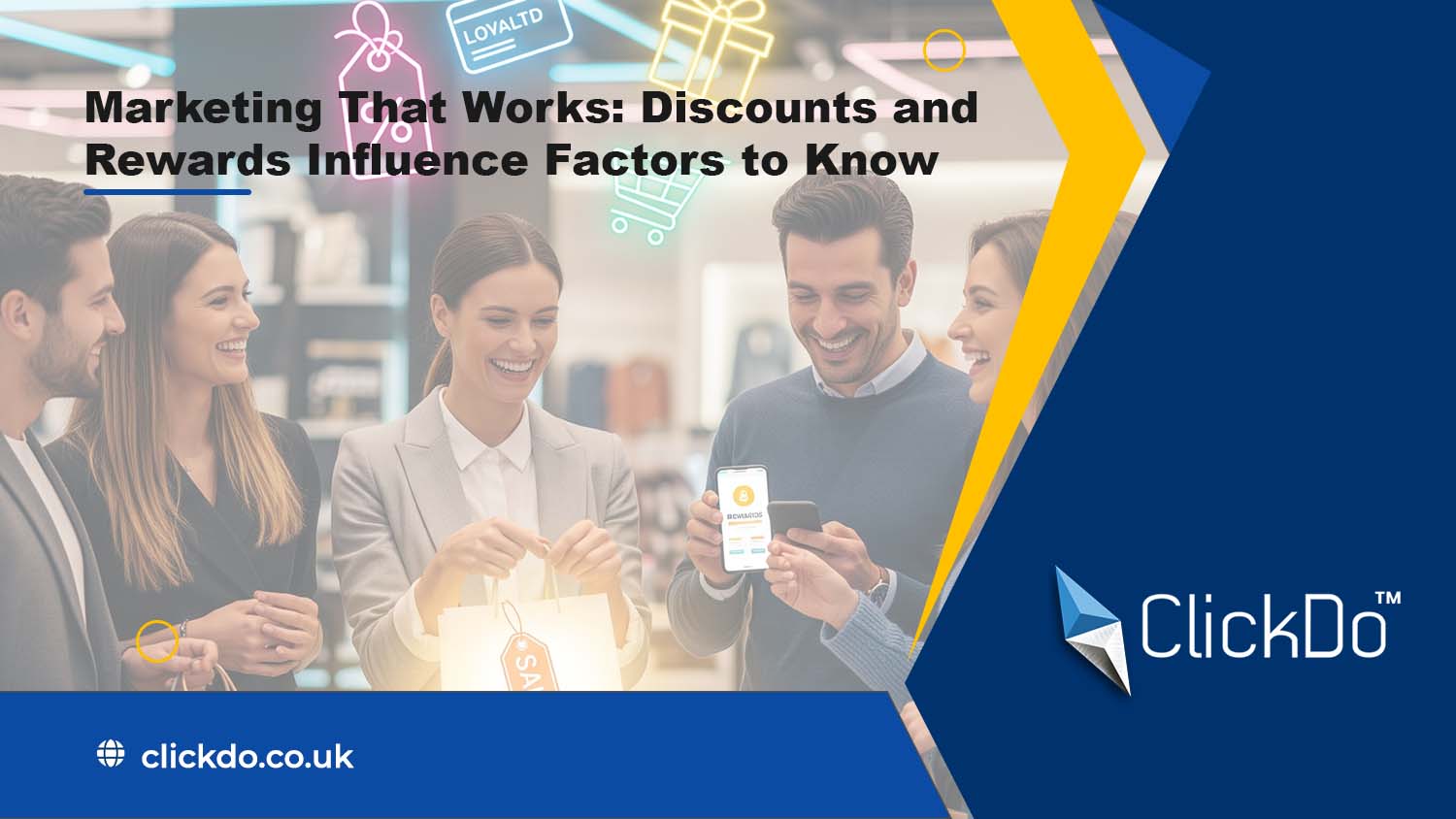
Marketing That Works: 8 Discount and Reward Influence Factors to Know
Sales, discounts, and rewards have been central to marketing strategies for decades. The concept is simple yet powerful: consumers respond positively when they perceive value.
From high street shops offering seasonal sales to online retailers promoting flash deals, the principle remains the same.
Promotions create urgency, stimulate interest, and can influence purchasing decisions immediately.
Despite the rise of digital marketing and sophisticated data analytics, these traditional tactics retain their effectiveness because they tap into fundamental aspects of human behaviour.
1. Creating Customer Engagement

Promotions do more than just drive short-term sales. They engage consumers and encourage them to interact with brands more frequently. Limited-time offers, special bundles, and loyalty rewards create a sense of excitement and anticipation.
Customers often explore products they might not have considered previously, increasing both engagement and brand exposure. For online retailers, personalised discounts and app notifications add an extra layer of connection, making the customer feel valued. This engagement fosters brand loyalty over time, which is far more valuable than a single purchase.
2. Versatility Across Sectors
Promotions are not confined to any single industry. They are a versatile tool that businesses of all kinds use to capture attention, encourage engagement, and build long-term relationships with customers. By offering value in creative ways, companies can appeal to both new and existing audiences.
For example, retailers often offer seasonal sales or loyalty points to attract customers and encourage repeat purchases. Similarly, online casinos provide another example, using welcome bonuses, deposit matches, and free spins to engage new players while rewarding regular users. While most online casinos offer a range of bonuses and promotions, gamers who value these rewards often seek out international non GamStop casinos, which operate outside of the UK’s strict rules, to find the best and most lucrative offers. These sites not only offer large promotions to players, but also attract gamers with other benefits, like game variety and flexibility.
Additionally, hospitality venues, such as local cafés or restaurants, might run happy hour deals or special weekend offers to entice visitors and build customer loyalty. This variety of examples demonstrates how promotions remain a fundamental marketing tactic across sectors, appealing to different audiences while driving engagement and repeat business.
3. Driving Repeat Business

Offering a variety of rewards and incentives as smart marketing tactics encourages customers to return. A shopper might initially be attracted by a discount on a first purchase, but is more likely to explore other products and services once they have a positive experience. Loyalty programmes, points systems, and exclusive deals for repeat customers create ongoing incentives to stay engaged with a brand.
For digital platforms, this might include personalised offers based on previous activity or spending patterns. The combination of perceived value and convenience motivates consumers to make multiple purchases, reinforcing brand loyalty.
4. The Psychology Behind Discounts
Understanding the psychology behind promotions helps explain why they remain so effective. Consumers respond to incentives because they trigger a feeling of satisfaction and achievement. A well-timed offer can spark immediate action, leveraging the fear of missing out or the thrill of getting a deal.
This emotional response is key to why promotions are more than just a pricing tactic; they are a tool for creating memorable shopping experiences. Businesses that consistently offer meaningful rewards cultivate a sense of trust and appreciation among their customers, which strengthens long-term relationships.
5. Encouraging Experimentation

Promotions can also encourage consumers to try new products or services. A discount or reward can make an unfamiliar product feel more accessible and less risky. Customers are more willing to experiment with flavours, styles, or features they might otherwise overlook.
For example, a clothing brand offering a discount on a new line or a food delivery service providing a special on a new dish allows consumers to explore options with minimal hesitation. This not only increases sales but also introduces customers to products they may incorporate into their routine.
6. Leveraging Technology for Personalisation
Modern technology has allowed businesses to refine promotional strategies and make them more personal. Online retailers can track browsing habits and purchase histories to tailor offers to individual customers. Notifications, emails, and app-based alerts ensure that promotions reach the right audience at the right time.
This personalised approach increases the likelihood of conversion while making customers feel recognised and valued. Even in traditional retail environments, technology such as loyalty cards or digital vouchers enables more targeted marketing, blending the advantages of both digital and in-person strategies.
7. Building Brand Loyalty

Consistent and meaningful promotions are essential for building long-term brand loyalty. Customers remember brands that offer value, treat them well, and make shopping or engagement enjoyable. Loyalty rewards, personalised discounts, and exclusive offers reinforce the emotional connection between consumer and brand.
In competitive markets, this sense of loyalty is invaluable, as it reduces churn and encourages advocacy. Satisfied customers are more likely to recommend a brand to others, amplifying the impact of promotional strategies.
8. Balancing Value with Sustainability
While promotions are highly effective, businesses must balance incentives with sustainable profitability. Excessive discounting can erode perceived value and reduce margins, but well-planned campaigns that offer tangible benefits maintain both customer satisfaction and financial health.
Businesses increasingly focus on strategic timing, personalised offers, and tiered rewards to ensure that promotions enhance rather than undermine the brand. This approach allows companies to maintain relevance in competitive markets while continuing to delight their customers.
Author Profile
- As the Chief of Marketing at the digital marketing agency ClickDo Ltd I blog regularly about technology, education, lifestyle, business and many more topics.
Latest entries
 Digital MarketingJanuary 15, 2026Growth Strategies with Marketing Automation & SEO in High-Competition Niches
Digital MarketingJanuary 15, 2026Growth Strategies with Marketing Automation & SEO in High-Competition Niches Digital MarketingOctober 24, 2025The State of AI and Digital Marketing in 2025: A Brief Analysis
Digital MarketingOctober 24, 2025The State of AI and Digital Marketing in 2025: A Brief Analysis Digital MarketingOctober 1, 2025How Dating Sites Climb to the Top of Google: SEO, Link Building, and the Cost of Visibility
Digital MarketingOctober 1, 2025How Dating Sites Climb to the Top of Google: SEO, Link Building, and the Cost of Visibility Digital MarketingSeptember 24, 2025Global vs Local SEO Strategies for UK Companies
Digital MarketingSeptember 24, 2025Global vs Local SEO Strategies for UK Companies

